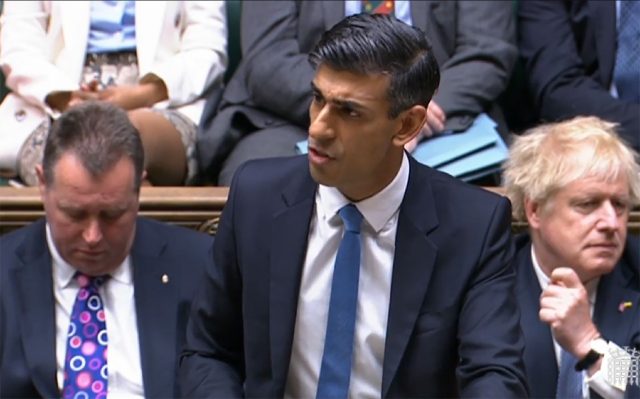Britain’s finance minister Rishi Sunak on Thursday unveiled a multi-billion-pound support package for consumers hit by soaring domestic energy bills, with help from a temporary windfall tax on oil giants.
A government package worth £15 billion ($19 billion) will be funded in part by an exceptional levy on soaring profits enjoyed by the likes of BP and Shell that have benefited massively from surging oil and gas prices.
Sunak acknowledged rocketing inflation is causing “acute distress” for Britons and ravaged household budgets nationwide, adding: “I know they are worried, I know people are struggling.”
The windfall tax marked a U-turn for embattled Prime Minister Boris Johnson, who previously insisted such a move would hinder efforts by oil majors to invest in greener energy.
But Sunak told parliament on Thursday: “It is possible to both tax extraordinary profits fairly and incentivise investment.”
The Chancellor of the Exchequer acted after British annual inflation surged to a 40-year high on rocketing energy costs, squeezing household budgets.
‘Hard struggle’
“We need to make sure that for those (for) whom the struggle is too hard and for whom the risks are too great they are supported,” Sunak added.
“This government will not sit idly by while there is a risk that some in our country might be set so far back they might never recover. This is simply unacceptable and we will never allow that to happen.”
One in five Britons are struggling or unable to make ends meet, pollsters YouGov said Thursday.
Countries around the world are experiencing decades-high inflation as the Ukraine conflict pushes up energy and food prices, in turn forcing the Bank of England and other central banks to hike interest rates.
25% windfall tax
Sunak said the new energy tax would be charged on the profits of oil and gas companies at a rate of 25 percent.
“It will be temporary and when oil and gas prices return to historically more normal levels the levy will be phased out.”
The tax would raise about £5 billion of revenue over the next year, according to the Treasury.
The money, plus a further £10 billion, will fund support payments helping especially the poorest.
However, all households will benefit from a £400 payment to cushion energy bills that are set to rocket further in the autumn.
Offsetting the windfall levy, meanwhile, would be a near doubling of investment tax relief for oil and gas firms.
“The more a company invests, the less tax they will pay,” Sunak told MPs.
Partygate
His address came one day after Johnson sought to “move on” from a critical report about his leadership that allowed lockdown-breaking parties at Downing Street.
Johnson and Sunak were fined by police over a breach of the laws they set for the public, causing widespread outrage.
Downing Street’s chief of staff Steve Barclay dismissed suggestions Thursday’s cost-of-living announcement was timed to deflect attention from the “Partygate” scandal.
The main opposition Labour party, which had repeatedly called for a windfall tax on energy giants, blasted the government over the delayed move.
While welcoming the levy, Labour finance spokeswoman Rachel Reeves demanded to know why the Conservative government had taken “so long”.
“This government’s dither and delay has cost our country dearly.”
She accused Johnson of simply seeking to move the news agenda on from Partygate.
“Labour called for a windfall tax because it is the right thing to do; the Conservatives are doing it because they needed a new headline,” Reeves said.
The share prices of oil majors BP and Shell were each up more than one percent following the announcement.
“Investors shrugged off” the news “given that it is expected to be a short-lived hit”, said Hargreaves Lansdown analyst Susannah Streeter.

COMMENTS
Please let us know if you're having issues with commenting.